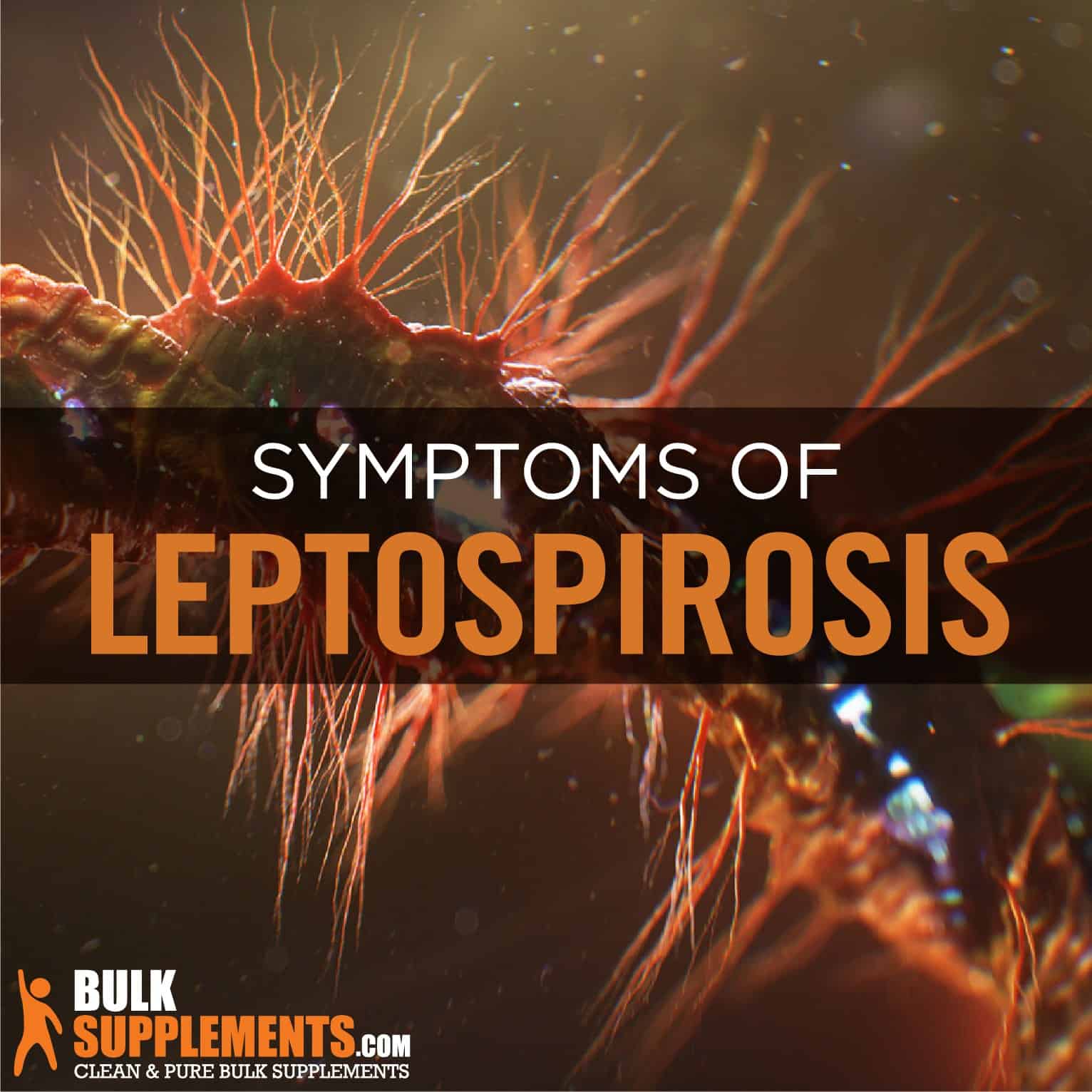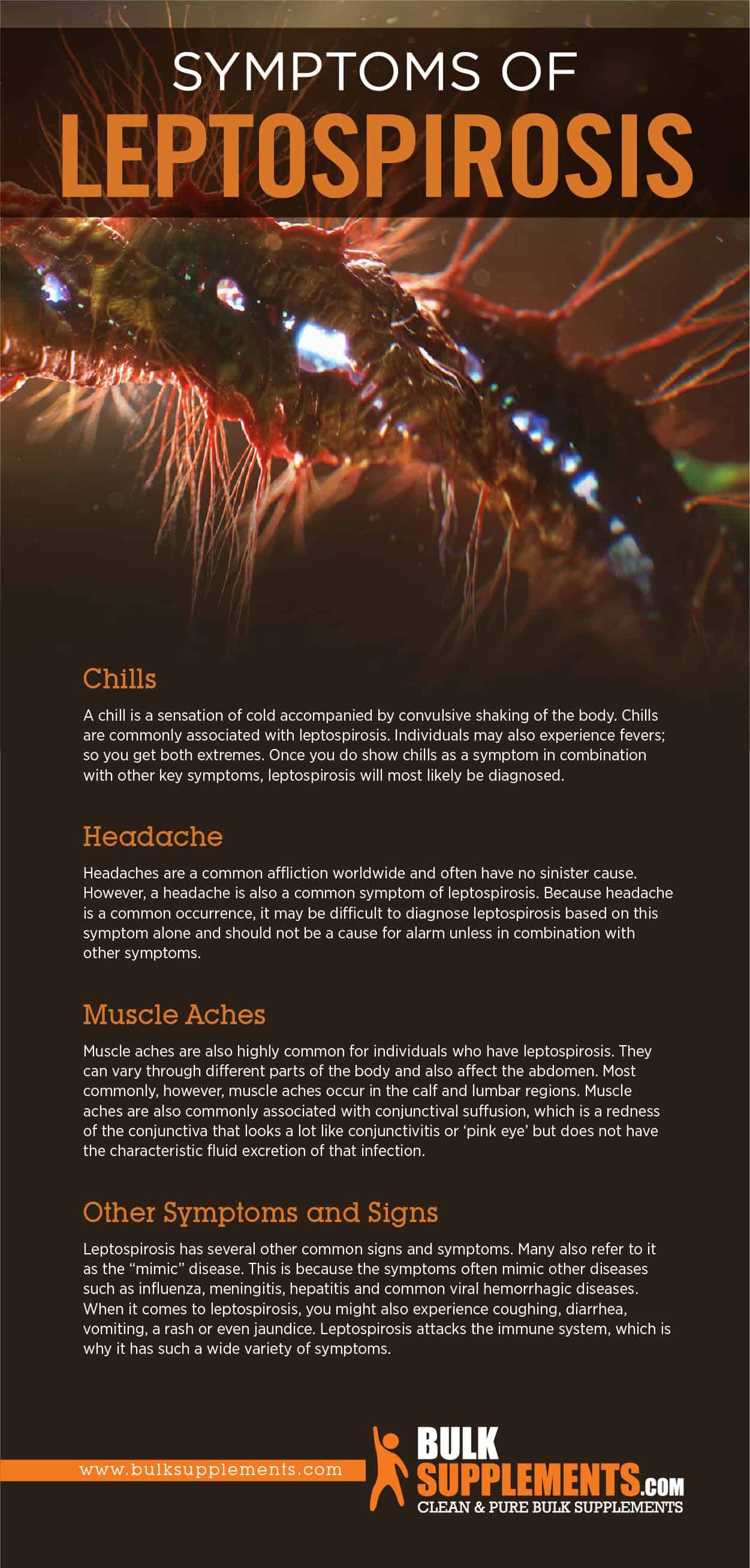Leptospirosis: Symptoms, Causes & Treatment
by James Denlinger Digital Marketing Strategist
What is Leptospirosis?
Leptospirosis is a rare bacterial infection. Statistically less than 1 per 100,000 people living in temperate climates contract it annually, with that statistic increasing to 10 or more per 100,000 people in tropical climates. If the infection has an epidemic, the number of cases can rapidly increase to 100 or more per 100,000 people.
Leptospirosis affects both humans and animals. The bacteria Leptospira comes from animal urine. Humans typically contract the disease when an open or unhealed wound comes into contact with animal urine, usually through water or soil that has had animal urine present. Specifically, it may enter through open wounds, the eyes or other mucous membranes. Some of the most common animals to carry the disease are rats, raccoons, skunks, foxes and opossums. If you are an individual who works commonly with water or soil, it is important to wear proper safety and protection clothing to avoid contracting this infection.
Leptospirosis is difficult to identify since some individuals show no symptoms at all, and the symptoms that do occur are usually similar to symptoms of other conditions. Failure to treat leptospirosis can lead to kidney failure, meningitis, liver failure, respiratory distress and death. Symptoms of leptospirosis can vary. A few common ones may include fever, muscle pain, bleeding in lungs, jaundice or chills.
Leptospirosis Symptoms
Chills
A chill is a sensation of cold accompanied by convulsive shaking of the body. Chills are commonly associated with leptospirosis. Individuals may also experience fevers; so you get both extremes. Once you do show chills as a symptom in combination with other key symptoms, leptospirosis will most likely be diagnosed.
Headache
Headaches are a common affliction worldwide and often have no sinister cause. However, a headache is also a common symptom of leptospirosis. Because headache is a common occurrence, it may be difficult to diagnose leptospirosis based on this symptom alone and should not be a cause for alarm unless in combination with other symptoms.
Muscle Aches
Muscle aches are also highly common for individuals who have leptospirosis. They can vary through different parts of the body and also affect the abdomen. Most commonly, however, muscle aches occur in the calf and lumbar regions. Muscle aches are also commonly associated with conjunctival suffusion, which is a redness of the conjunctiva that looks a lot like conjunctivitis or ‘pink eye’ but does not have the characteristic fluid excretion of that infection.
Other Symptoms and Signs
Leptospirosis has several other common signs and symptoms. Many also refer to it as the “mimic” disease. This is because the symptoms often mimic other diseases such as influenza, meningitis, hepatitis and common viral hemorrhagic diseases. When it comes to leptospirosis, you might also experience coughing, diarrhea, vomiting, a rash or even jaundice. Leptospirosis attacks the immune system, which is why it has such a wide variety of symptoms.

Leptospirosis Causes
Leptospira Bacteria
Leptospira is specifically the bacteria that causes leptospirosis. Although typically mild, it can result in liver or kidney failure as well as several other conditions that can be fatal in themselves. Leptospira inhabit animals’ kidneys and is released in their urine. Such animals may include buffaloes, pigs, bats, sheep, cats, dogs and raccoons, among others. The Leptospira can remain active in water and soil for months, so it is difficult to say when a source is clear or uncontaminated.
Animal Urine
Animal urine is the agent by which the Leptospira travels. Once the Leptospira is released through the urine, contamination can occur anywhere the urine has been or may be present. This may include in contaminated water or soil and be contracted through open cuts or wounds, the eyes, nose or mouth and less commonly when an individual comes into contact with the blood of an infected animal.
Ingesting Contaminated Food or Water
As mentioned above, any food or water source that may be contaminated with animal urine with the bacteria Leptospira, can cause leptospirosis. Food and water can become easily contaminated, especially in places where health standards are lower. For example, rats can easily contaminate food or water at a restaurant.
Other Causes
Leptospirosis has cases reported worldwide, but is especially common in areas with tropical climates. Leptospirosis is also especially common for individuals who work outdoors with animals, such as farmers, slaughterhouse workers, veterinarians, fish workers and dairy farmers. If you work in any of these fields, it is important to follow the recommended safety precautions at all times.
Leptospirosis Treatment
Antibiotics
Antibiotics is the primary method of treatment of leptospirosis. When it comes to leptospirosis, the sooner one takes the antibiotics, the better the chances an individual has for recovery. The most common antibiotics are doxycycline or penicillin. Intravenous antibiotics may also be necessary if the condition worsens. Otherwise, typical antibiotics have proven to be highly effective.
Medical Attention if Condition Worsens
Although it is only in a small number of cases, leptospirosis can sometimes require medical attention and hospitalization if the condition worsens. For example, from 1998 to 2009, the number of hospitalizations for leptospirosis was 0.6 per 1,000,000 hospitalizations. One way to decrease hospitalizations and stop the spread of it is by educating health care providers about early detection of leptosporosis.
Supplements for Leptospirosis
It is important to ensure that no supplement will interfere with the antibiotics that you are prescribed. There are several supplements that can help to support the body in fighting infection, as well as help with symptom alleviation.
To Support Immunity
Leptospirosis specifically has an ‘immune phase’ in which antibodies are created to fight off Leptospira, and will remain in the patient’s urine during this time. Thus, taking supplements that boost your immune system can lower the side effects during the immune phase such as muscle pain and fever.
Garlic
Garlic is capable of boosting immunity. It contains sulfur, which turns into allicin. Allicin is the key compound that gives it its immune-boosting qualities. The recommended dose of garlic is 650 mg daily.
Ginger
Ginger is another known supplement for immune support. It contains antibacterial agents that can kill certain bacteria. When studied specifically on leptospirosis, ginger is shown to reduce anti-inflammatory cytokines, which helps reduce potential organ damage. The recommended dosage is 1,000 mg once daily.
Vitamin D
Most people consider vitamin D the sunshine vitamin, but you can also get it from several of the foods you eat, including eggs, salmon, liver and milk. Vitamin D is also known to play important roles in bone health, but it has several immune boosting benefits as well. Taking vitamin D for leptospirosis can help to manage symptoms.
For Muscle Aches
Collagen
Collagen supplements come in pill or powder form and does wonders for the body. It is often prescribed for almost any muscle pain including back and joint pain, so if you’re experiencing any muscle pain with leptospirosis, collagen may help. This is because collagen is a natural part of your major muscle tissue, thus replenishing it when it comes to leptospirosis. The recommended amount of collagen per day is 5 grams or up to 30 grams as described by a doctor for specific conditions.
There are different methods of extraction to fit dietary choices as it can be sourced from different animals — bovine collagen, porcine collagen, chicken based collagen and fish based collagen.
Calcium
Calcium is yet another important vitamin. It does help build strong bones, but it also helps with muscle aches as well. Research indicates that calcium is actually significantly and positively correlated with non-specific pain and weakening of the muscles, but consuming calcium had massive changes on muscle function and relief.
Magnesium
On the other hand, there is such thing as too much calcium, which may also cause muscle aches in addition to your leptospirosis. Fortunately there is magnesium. Magnesium helps block excess calcium from depositing into your muscles and causing buildup.
For Fever Support
White Willow
White willow is better known as nature’s aspirin. It is a natural pain reliever due to the active ingredient salicin. In fact, white willow is a natural alternative to aspirin because it works in the same way — reduces inflammation and pain as it enters the bloodstream.
Elderberry
Elderberry is a dark purple berry from the European elder tree. The elderberry has several uses including for the common cold, influenza and swine flu. Specifically, it helps by reducing pain and fever. Elderberry seems to interact with a virus directly to improve the immune system.
Feverfew
Feverfew‘s name is quite fitting. Individuals take feverfew by mouth to reduce fever, headaches and migraines, but what is it? Feverfew comes from a plant. It is a bushy, aromatic Eurasian plant that comes from the daisy family. Feverfew is effective thanks to an ingredient called parthenolide. Parthenolide decrease the factors that cause headaches, migraines and fevers.
The Bottom Line
Leptospirosis is a bacterial infection which is spread by contact with urine contaminated soil or water. Outdoor manual workers and animal worker’s have a higher likelihood of contracting the infection, but exposure through food or water is also possible. Symptoms include chills, fever, headache, and muscle ache. In most cases leptospirosis is treatable, but the key is early detection as it can lead to severe conditions such as kidney failure, meningitis, and liver failure. As always, consult your doctor as soon as you experience one or more of the symptoms of leptospirosis, and make doctors aware of your natural supplements as they may interfere with the treatment plan.
Sponsor Ads
Created on Mar 5th 2020 13:24. Viewed 317 times.



